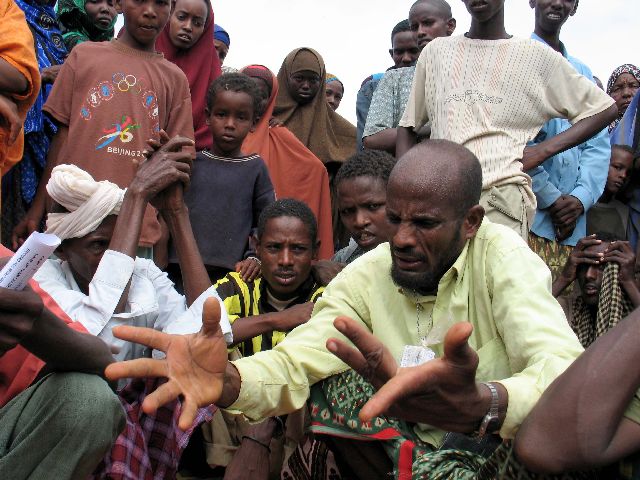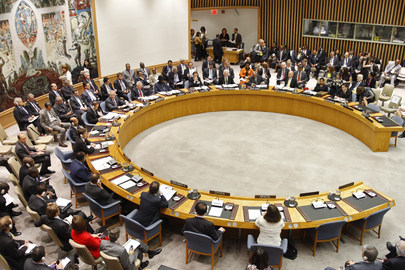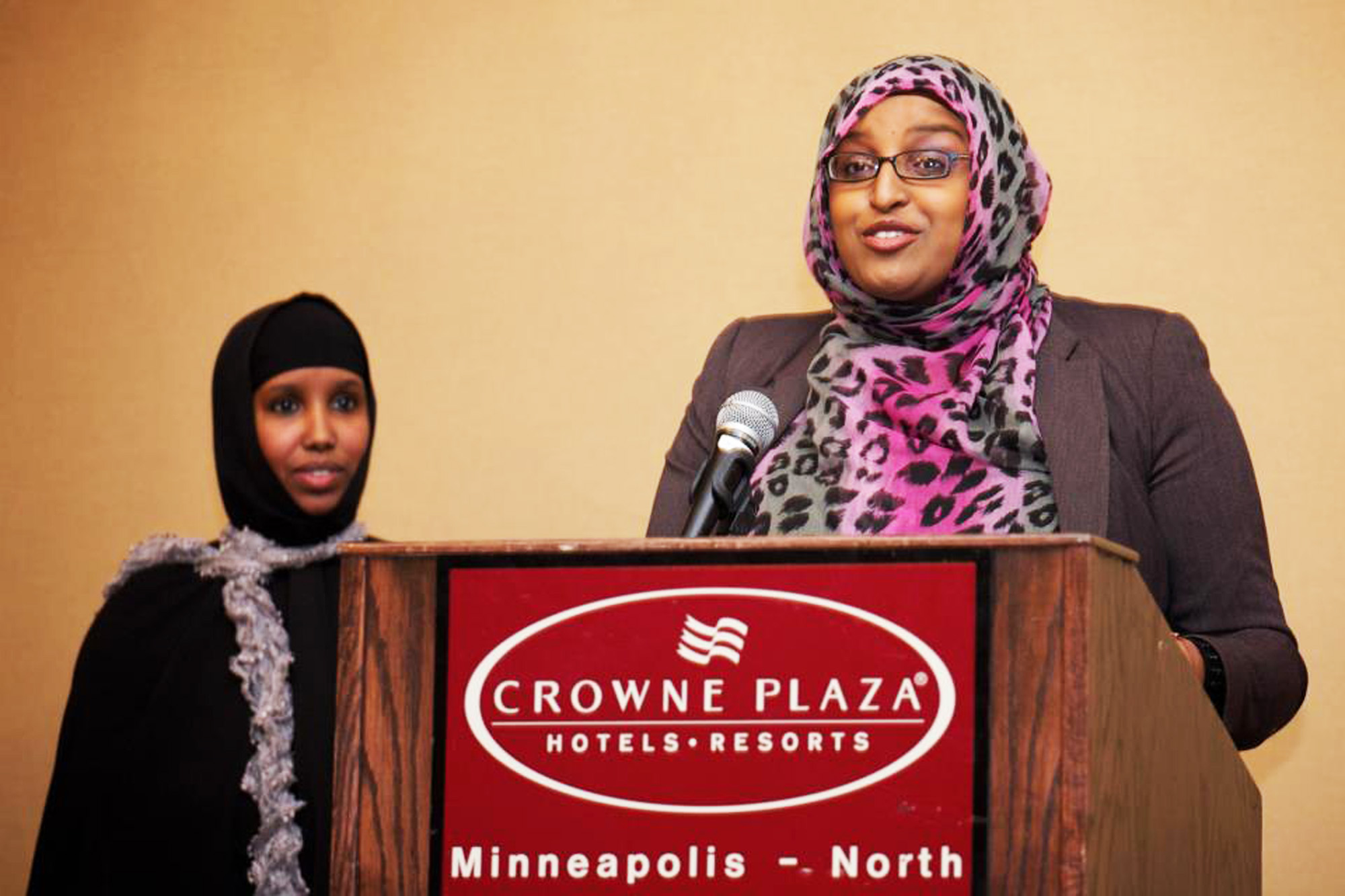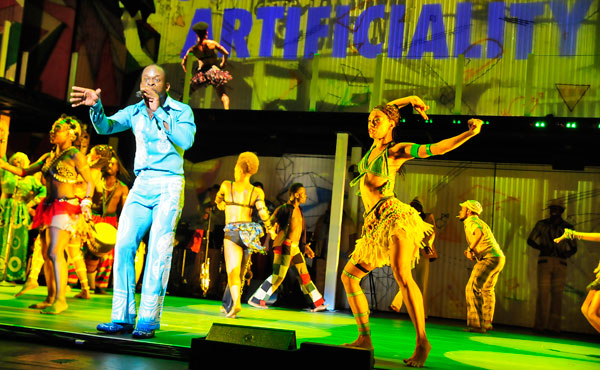Seattle, WA—Asha Mohamed knew America was the place for her soon after her arrival in a Kenyan refugee camp. “They gave me two books, a Bible and a pamphlet that talked about the American Constitution.” She was familiar with the former, but found the latter “the most fascinating document that I could ever read.”
As a refugee, Mohamed was then a young teenager who had become separated from her family during a chaotic episode of Somalia’s civil strife.
“Strangers took me from Mogadishu to Mombasa [in Kenya],” she explained, adding that she knew little of the Somali language. Coming from a somewhat privileged family, she had been educated in Italy.
In Italian schools, the study of English was mandatory and Mohamed’s most vivid impressions of America had been gleaned not from the ideals of its founders, but from the glamour and glitz of U.S. television exports. “My view of America was Dallas, Dynasty, and,” she added zestfully, “Wonderwoman!”
She was grateful to eventually reunite with her family members who also had made their way to Kenya. “None of my closest relatives were harmed,” she said. After two years there, she received her parents’ permission to come to America to study to be lawyer. Though, traditionalists in many ways, they were afraid of losing their daughters to Western culture, yet cognizant of the skills needed to survive in an interdependent world.
“I expected America to be this beacon of hope,” Mohamed said. Upon her arrival, she recalled being disappointed to find discrimination against women and “visible signs of racism.” There was economic shock as well.
Her legal sponsor was an aunt living in San Jose, one whose daily circumstances differed from what Mohamed had been accustomed.
“In Africa, we were affluent …. We had everything on speed dial,” she said bemusedly. “My aunt said, ‘Asha, we are poor here. You need to understand that. ’”
Mohamed did not.
“I didn’t want to accept the reality that she lived.” She thought her aunt had “settled” for a lower socio-economic status; that she had “given up.”
Reflecting, Mohamed said she realizes, “I was judgmental.” She knew little of the financial challenges of working class Americans.
In all her youthful naiveté, Mohamed too was still a product of a conservative Muslim culture. She said she chose to stand, like most Somali women, “by your community, by your faith, by your traditions.” She got married at 19. Her husband found a job in Seattle. “I wanted to go to New York .… He fell in love with the Emerald City.”
Now a mother of three, Mohamed is a counselor for the Seattle Housing Authority. She is also a community organizer, and a fervent immigrants’ and human rights activist at CURE – Coalition to Undo Racism Everywhere. She is looking forward to her role as a delegate to the Equal Voice for America’s Families town hall meeting in Los Angeles on Sept. 6. “We’re bringing 400 people from Seattle, 600 from the state,” she said energetically, prayerful that from within her group will emerge some who will help comprise “the next generation of critical thinkers.” Underwritten by the Marguerite Casey Foundation, there will be two other concurrent town halls in Birmingham and Chicago, respectively. The three-city event is expected to attract nearly 15,000 people, many of whom will have attended local and regional town halls 2007-2008.
Mohamed participated in an Equal Voice policy platform meeting in Chicago earlier this year where attendees spent four days to produce a working agenda for low-income families. That agenda will be submitted for approval on Sept. 6.
While in Chicago, Mohamed said she was fortunate through Equal Voice to make valuable contacts with community organizers who have experience in facing some of the issues plaguing Seattle, particularly the city’s resurgence of gang violence.
“We’re back in the ‘90s,” Mohamed exclaimed, except now it’s “East African gangs trying to get street cred.” She lamented, for example, the recent death of a 16-year-old Somali youth she had known since he was eight. He took an African-American friend to attend a Somali wedding. Afterwards, while driving down the highway, he was followed and shot by fellow Somalis, apparently enraged at him for “betraying his people” by bringing an African-American guest.
Mohamed said that there are now “stabbings left and right,” territorial disputes over drug distribution turf among Asian, Latino, African American, and East African gangs, all being fueled by new Somali arrivals from Minnesota and Ohio. It is very tough for parents to admit to the accusations, she said, that “your kid sells drugs, your kid does drugs.”
Mohamed still finds America’s ethnic diversity fascinating. She has encountered courageous individuals – Muslims and non-Muslims — who stood with her in her outspoken criticism against the persecution of Muslims in her community after 9-11. “I started doing training in high schools, ‘No Hate in Washington,’” she said. She challenged the Patriot Act and has collaborated in organizing opposition to the U.S. invasion and occupation of Iraq. Throughout her still evolving career as an activist, she has made no distinction between being a Muslim and an American.
Through her efforts, Mohamed had helped many in Seattle’s immigrant community to secure social services, their green cards, and even U.S. citizenship, but “it never occurred to me to get my own citizenship.” A phone call changed that: “Hey Asha, your mom is very sick. She’s in Dubai.”
Mohamed went through the preparations for travel, including filing for U.S. citizenship, but the bureaucracy was daunting. Ultimately, her mother died before she could leave, and had she left, she would not have been able to return — a mother, a wife, a woman who, by her account, has defended the best of America’s principles. “No one gives you a license to mistreat people because they’re poor or different.”
Now officially an American, and soon to complete her undergraduate degree, Mohamed has her sights set on being an immigration attorney. Her law degree will be a Golden Lasso, of sorts, enabling her to hold those in authority accountable. “This is the Golden Lasso. Besides being made from an indestructible material, it also carries with it the power to compel people to tell the truth. Use it well, and with compassion.” – Queen Hippolyte to Wonder Woman
About Khalil Abdullah
- Web |
- More Posts(1)







